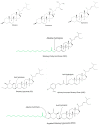The Lack of Standardization and Pharmacological Effect Limits the Potential Clinical Usefulness of Phytosterols in Benign Prostatic Hyperplasia
- PMID: 37111945
- PMCID: PMC10142909
- DOI: 10.3390/plants12081722
The Lack of Standardization and Pharmacological Effect Limits the Potential Clinical Usefulness of Phytosterols in Benign Prostatic Hyperplasia
Abstract
The prevalence of benign prostatic hyperplasia (BPH) markedly increases with age. Phytotherapeutic approaches have been developed over time owing to the adverse side effects of conventional medications such as 5-reductase inhibitors and α1-adrenergic receptor antagonists. Therefore, dietary supplements (DS) containing active compounds that benefit BPH are widely available. Phytosterols (PSs) are well recognized for their role in maintaining blood cholesterol levels; however, their potential in BPH treatment remains unexplored. This review aims to provide a general overview of the available data regarding the clinical evidence and a good understanding of the detailed pharmacological roles of PSs-induced activities at a molecular level in BPH. Furthermore, we will explore the authenticity of PSs content in DS used by patients with BPH compared to the current legislation and appropriate analytical methods for tracking DS containing PSs. The results showed that PSs might be a useful pharmacological treatment option for men with mild to moderate BPH, but the lack of standardized extracts linked with the regulation of DS containing PSs and experimental evidence to elucidate the mechanisms of action limit the use of PSs in BPH. Moreover, the results suggest multiple research directions in this field.
Keywords: benign prostatic hyperplasia; campesterol; dietary supplement; phytosterol; sitosterol.
Conflict of interest statement
The authors declare no conflict of interest.
Figures




References
Publication types
LinkOut - more resources
Full Text Sources

